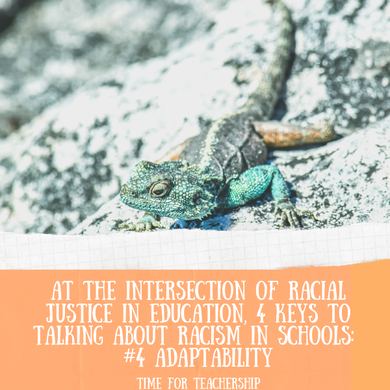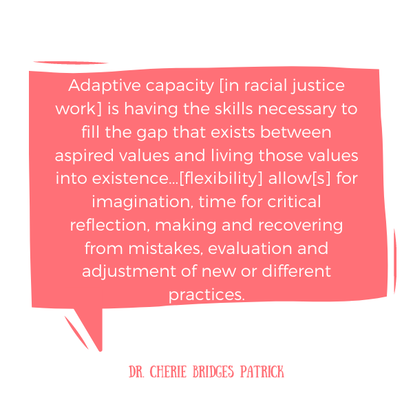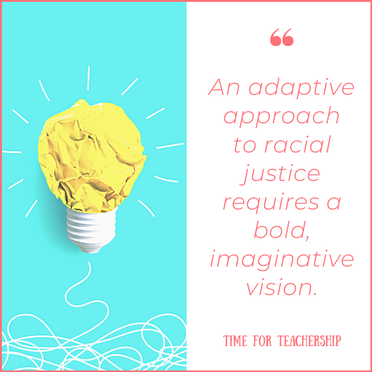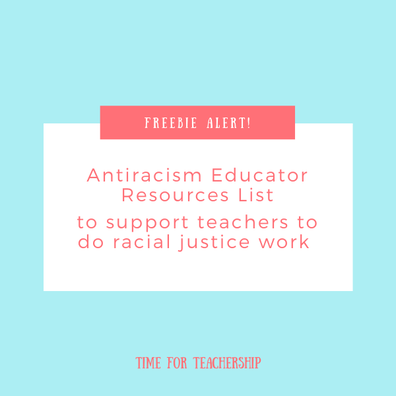|
7/2/2020 At the Intersection of Racial Justice in Education, 4 Keys to Talking About Racism in Schools: #4 AdaptabilityRead NowThis is the final post in our 4-post series featuring Dr. Cherie Bridges Patrick’s research on the four capacities that can enable us to have generative racial dialogue. Please read the others! You’ll find part one that discusses the importance of a positive, encouraging, liberating dialogic environment here, part two, on the readiness and willingness to engage in antiracism and racial justice work, here, and, part three, on vulnerability here. Today’s post will focus on the fourth and final discourse capacity: adaptability. Let’s dig in. Adaptability. This capacity comes from Heifetz, Grashow, and Linksy’s (2009) work on adaptive leadership.They argue that one of the biggest reasons for leadership failure is trying to meet an adaptive challenge with a technical fix. They define an adaptive challenge as, “the gap between values people stand for (that constitute thriving) and the reality that they face in their current lack of capacity to realize those values in their environment.” Dr. Bridges Patrick challenges the common desire for many White people to commit to colorblindness or to the notion that racism is about the individual noting that it limits people’s ability to “efficiently identify, talk about, and address systemic challenges.” Heifetz and his colleagues contextualize this within their adaptive challenge idea, writing, “[We] resist dealing with adaptive challenges because doing so… requires a modification of the stories [we tell our]selves and the rest of the world about what [we] believe in, stand for, and represent.” According to Dr. Bridges Patrick, building up this adaptive capacity requires us to engage in critical self-reflection and praxis (applying theory in practice), accept living in a state of moderate uncertainty, be open to shifting our “priorities, beliefs, habits, and loyalties”, and engage fully with our whole selves, body, mind, and spirit. What does this look like in educational spaces? From the perspective of adaptability, Dr. Bridges Patrick suggests that technical fixes and practices consist of responses, beliefs, and practices that contribute to maintaining the status quo. These are well-known, commonly accepted routines that are practiced without conscious thought. She says, “take Sophia in my study, for example. She was a Black professional committed to antiracism who worked with an all-white medical team. Using a longitudinal study, Sophia presented the ways racism impacted the kind of medical care African Americans received. What Sophia experienced with her team in that moment was performative silence: “I just shared an article with my team that just came out of a longitudinal study that looked at [medical care] for African Americans and the ways that racism impacts the kinds of care they get, how soon they get a [medical] diagnosis . . . all of those things and so I gave them the article and I broke it down and they’re like, oh, this is really very interesting.” The silence was an unspoken, group agreement to avoid a potentially informative conversation about improving health care. There are too many other challenges that arise from this scenario for me to explore, but one is the impact the silence had on Sophia, members of the team, and the patients they served. Sophia ended the story by saying “you would have thought I threw a bomb in the middle of the room”. Adaptability then is both an individual and group or organizational characteristic that moves beyond technical, implicit processes. Applying adaptability to the previous scenario in the context of antiracism would have required someone in the group to do something different. Rather than remaining silent, an adaptive response may have encouraged a question to advance a conversation. Adaptive capacity is having the skills necessary to fill the gap that exists between aspired values and living those values into existence. Within the adaptive individual or team/organization is a container or structure that welcomes and supports new ways of thinking and practicing. This flexibility shifts, expands, and shrinks to allow for imagination, time for critical reflection, making and recovering from mistakes, and evaluation and adjustment of new or different practices. Adaptability means interrogating our long-held beliefs about how school is done and what school should look like. It means critically examining disconnects between what we say we value and what our policies, pedagogies, and assessments indicate we actually value. It means having a structure (leadership, resources, etc.) that supports this kind of work and a plan to navigate the resistance that will surface to maintain the status quo. Let’s take one example of each. Policies. If we say our primary mission as an organization is to educate all students, but our dress code sends students (disproportionately Black female students) out of the classroom, we are not actually prioritizing students’ education. Instead, we are valuing conformity to the dominant (read: white) norm about how students should dress and groom themselves more than ensuring students learn educational standards. Pedagogies. If we say we value student engagement, but we (teachers) talk for the majority of the class time, lecturing and asking students to remain silent, and never asking for critical feedback from students, we actually value obedience to authority (often, white authority) more than student voice and engagement. Assessments. If we say we value creativity and critical thinking, but we grade students by how well they answer factual multiple choice tests, we actually value memorization and regurgitation of content more than an ability to creatively apply concepts to novel situations. (The use of standardized tests has not served as an accurate measure of students’ abilities, namely students who have been grossly underserved by our education system, many of whom are our Black, Latinx, and Indigenous students.) An adaptive approach to racial justice requires a bold, imaginative vision. Hopefully the increased visibility of antiracist work and its importance will serve as what Mezirow calls a “disorienting dilemma,” an experience that doesn’t fit with a person’s expectations or beliefs. Many educators may have believed their schools were working for racial justice, but upon further examination, are becoming aware their schools are perpetuating white supremacy. We hope you can use this moment to call others into the work, collectively identify racist policies and practices, and collaboratively dismantle them. To help you, we’ve put together a resource list. Finally, although this is the last post in Dr. Bridges Patrick’s 4-post series on the Time for Teachership blog, we can all continue to learn from her! You can follow her on Instagram at cheriebpatrick, on LinkedIn, or visit her website.
1 Comment
Leave a Reply. |
Details
For transcripts of episodes (and the option to search for terms in transcripts), click here!
Time for Teachership is now a proud member of the...AuthorLindsay Lyons (she/her) is an educational justice coach who works with teachers and school leaders to inspire educational innovation for racial and gender justice, design curricula grounded in student voice, and build capacity for shared leadership. Lindsay taught in NYC public schools, holds a PhD in Leadership and Change, and is the founder of the educational blog and podcast, Time for Teachership. Archives
May 2024
Categories |





 RSS Feed
RSS Feed